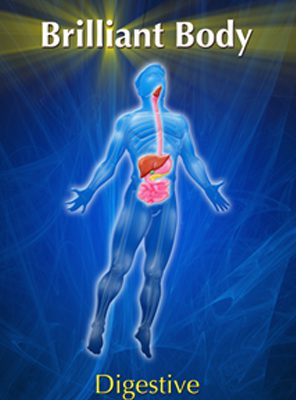The digestive system carries out a series of physical and chemical changes by which food is broken down in preparation for absorption from the Intestinal System into the bloodstream. The Digestive System includes the mouth, pharynx, esophagus, stomach, small and large intestine (colon). Digestive juices, called “enzymes”, cause the chemical breakdown of food. Further processing takes place in the small intestine. Imbalances in this system affect nutrient absorption and therefore impact all other body systems. The Circulatory System is often affected by imbalances in the Digestive System, as unwanted toxins are absorbed and elimination stagnated. The need for efficient digestion cannot be overstated.
This system is considered your first “Pillar of Health”. This means that this is the first place that will determine how healthy you will be.
Try this at home. The Food Enzymes Experiment:
Take 2 small bowls of cooked oatmeal. To one bowl, add 4 capsules of food enzymes. Empty the capsules into the oatmeal and mix together. Leave other bowl alone. Put bowls side by side and leave alone for 15 minutes. After this time your will notice that the bowl without enzymes is thick and literally won’t come out of the bowel. The enzyme mix is like water consistency or mush. This demonstrates how effective enzymes are at speeding up the digestive process. Enzymes are the catalysts for reactions, making the breakdown of food happen at an accelerated rate
The Digestive System: Primary Problems and Inadequacies
Problem #1: Transit Time
One of the most prevalent problems associated with the digestive system is related to transit time. Transit time is a measure used to denote how long it takes for food to be broken down and go through the 30 foot digestive system end to end. Normally, it is about 18-24 hours-it takes 3-6 hours for a meal just to be converted to nutrients. Problems can occur when transit time is either too slow or too fast. * see my other article on “Bowel Issues for a more in depth information about this. (put a link here to go to my article on Bowel Issues)
Problem #2: Inadequate Enzymes
Foods need to be properly digested to allow absorption. This can only be done with the help of enzymes. Without digestive enzymes-which speed up the digestive process-food would take the same amount of time to digest as it does when rotting in warm open air. By design, we do have sufficient enzymes to ensure digestion. But what is not generally known is that today our enzymes have to combat “shelf-life food”. Modern-day foods did not exist when nature originally figured out our lifetime supply of enzymes. Foods today are processed, boxed, canned, refined, heat-treated, pasteurized, radiated, microwaved, and packaged. Our enzymes were designed for food that is fresh, partially digested by nature, and alive. That does not describe “shelf-life food!” Preservatives, chemicals, additives and heat also destroy any additional natural enzymes present within food, not to mention the natural enzymes we were born with.
Another thing enzymes are required for is detoxification. They turn fat-soluble materials and waste into water for easier elimination. Thus we see that fewer enzymes equal more toxicity. Enzymes help ensure the removal of harmful allergens, pollution, heavy metals, and toxins from the body. Enzymes also maintain a normal pH level in the digestive system, which is critical in reduction inflammation.
Problem #3: Not Enough Probiotics
Similar to enzymes, the body also needs friendly bacteria, or probiotics, to ensure proper digestion and absorption. Probiotics prevent any harmful organisms from making our digestive system their home. Probiotics even help to supplement our diet by manufacturing vitamins and providing immunity.
Probiotics are found in both the small intestine and colon, but the colon contains a majority of these friendly bacteria. A normal individual should have around 1000 trillion of these “food guys” in the intestines. They can even account for 10% of total body weight! The most familiar strains are as Lactobacillus acidophilus and Bifidobacterium longum (acidophilus and bifidophilus).
The roles of probiotics include:
- Producing additional enzymes
- Producing antibiotic substances (to fight bad bacteria)
- forming B-vitamins
- reducing liver stress
- preventing constipation
- boosting immunity
It is critical to keep up the probiotic population and keep the environment they live in healthy. With the widespread use of antibiotics, chemicals, and the standard North American diet, our levels of probiotics can become depleted. That is why supplementation can be very beneficial.
Problem #4: Hiatal Hernia
Another missed or misdiagnosed area of the digestive system deals with something called the hiatus. The diaphragm, which is the breathing muscle that separates the chest from the abdomen, contains and opening called the hiatus. This is where the esophagus passes through to reach the stomach. Occasionally part of the stomach protrudes through the hiatus, creating a hernia that permits the backflow of acid or chime up into the throat. The result is often known as “heartburn”, or acid reflux disease. Doctors can confuse heart disease or ulcers with a hiatus hernia because the symptoms are remarkably similar. Sometimes they simply treat the problem with antacids. A hiatus hernia can cause great pain, difficult breathing, heartburn, etc.
Problem #5: Hydrochloric Acid (HCL) Imbalance
The multi-billion dollar antacid industry might have you believing that stomach acid is bad for you. Although antacids can be helpful, they are not the answer for what causes heartburn or indigestion in the first place. Stomach acid, or JCL, breaks down protein and fight off microbes. It stimulates the pancreas and small intestines to produce additional enzymes, as well as bile. The truth is that treatments aimed at neutralizing stomach acid can actually make your digestive problems worse.
The stomach has mucus lining which forms a barrier between the stomach wall and the acid produced. This is nature’s way of protecting the stomach from the strength of its contents. The lining of the stomach sheds cells at the rate of half a million every minute. They are replaced so rapidly that the stomach has what amounts to a new lining every three days.
The question is then, should we be trying to stop JCL production with antacids? As we get older (usually after age 40) we tend to make less HCL anyway. Add to that a poor diet, overeating, and inhaling your food, and you may find you have digestive and immune issues. Low levels of stomach acid can produce protein malnourishment. This leads to acidic blood (a pH imbalance), setting the stage for toxins, illness, and disease. It can also lead to mineral deficiencies. As the blood becomes acidic, your bloodstream will look for minerals anywhere in the body to counter the pH problem. It will even steal the mineral s from your bones, which contributes to osteoporosis.
A basic equation for this type of digestive problem is: low stomach acid=acidic blood=low minerals.
Symptoms of this cycle can include:
- bloating
- flatulence
- heartburn
- diarrhea
- constipation
- acne
- chronic Candida
- food allergies
- immune problems
Did you know:
- There are more organs in your digestive system than in any other system in the human body.
- Up to 2/3rds of all of your body parts are used just for digestion.
- You use up to2/3rds of your daily energy just to complete the process of digestion.
- That after you eat, it usually takes around 24 hours in healthy adults for the complete process of digestion to occur?
- That the lining of the stomach has 35 million tiny glands that pour out two to three quarts of gastric juice every day. When food is introduced, the juice flows faster.
- It is estimated that up to 75 % of our entire immune system can be attributed to a healthy population of probiotics?
- The hydrochloric acid found in the stomach is corrosive enough to dissolve a razor blade.
- Heartburn is not the result of excessive stomach acid; it is the result of not enough!
- It is estimated the average North American has from 5-25 pounds of undigested fecal matter in their bowels at all times. (Because the person could not digest it properly).
- In many ways, the small intestine is like a second brain. The small intestine contains as many neurons as your spinal column, and 95% of your serotonin-the brain’s mood-regulating chemical-is contained in your small intestine’s elaborate network of nerves. That’s why we feel strong emotions, such as fear, love and anticipation in the gut as well as our minds. The intestines can also be affected in the same way that the brain is from a lack of serotonin. Inadequate serotonin in the brain can cause depression; in the gut, it can lead to irritable bowel syndrome.
Each day the digestive system processes approximately 2.5 gallons of food, liquids, and bodily secretions. It is an extremely efficient and life-sustaining mechanism. Proper care and maintenance of your digestive system will help ensure a long and healthy life!



